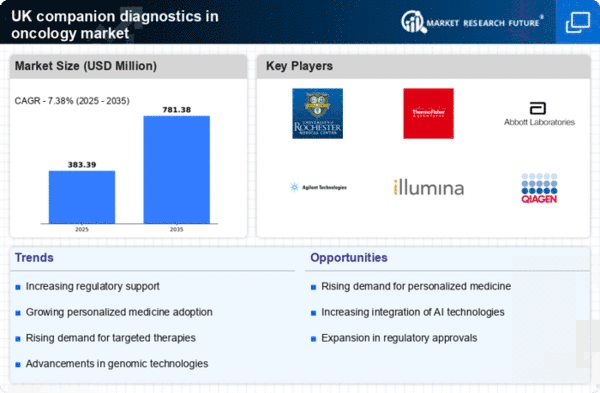Advancements in Technology
Technological advancements in molecular biology and genomics are significantly influencing the companion diagnostics-oncology market. Innovations such as next-generation sequencing (NGS) and digital PCR have enhanced the accuracy and efficiency of diagnostic tests. These technologies enable the identification of specific biomarkers associated with various cancers, facilitating the development of tailored therapies. The UK has seen a notable increase in research funding, with investments reaching over £200 million in the last year alone, aimed at improving diagnostic capabilities. This influx of resources is likely to accelerate the introduction of novel companion diagnostics, thereby expanding the market. Furthermore, the integration of artificial intelligence in data analysis is expected to streamline the diagnostic process, making it more accessible and reliable for clinicians and patients alike.
Rising Incidence of Cancer
The increasing incidence of cancer in the UK is a primary driver for the companion diagnostics-oncology market. According to recent statistics, cancer cases are projected to rise by approximately 10% over the next decade. This surge necessitates the development of targeted therapies, which rely heavily on companion diagnostics to identify suitable patients for specific treatments. The companion diagnostics-oncology market is thus positioned to expand as healthcare providers seek to improve patient outcomes through personalized medicine. The National Health Service (NHS) has also recognized the importance of these diagnostics, integrating them into treatment protocols to enhance the efficacy of cancer therapies. As the population ages and lifestyle factors contribute to higher cancer rates, the demand for companion diagnostics is likely to grow, driving innovation and investment in this sector.
Regulatory Framework Enhancements
The evolving regulatory landscape in the UK is fostering growth in the companion diagnostics-oncology market. Recent initiatives by the Medicines and Healthcare products Regulatory Agency (MHRA) aim to expedite the approval process for innovative diagnostics. This regulatory support is crucial for companies developing companion diagnostics, as it reduces time-to-market and encourages investment in research and development. The UK government has also introduced policies that promote collaboration between regulatory bodies and industry stakeholders, enhancing the overall efficiency of the approval process. As a result, the companion diagnostics-oncology market is likely to witness an influx of new products, which could improve patient access to cutting-edge therapies and ultimately lead to better health outcomes.
Increased Focus on Personalized Medicine
The shift toward personalized medicine significantly drives the companion diagnostics-oncology market. Healthcare providers in the UK are increasingly recognizing the value of tailoring treatments to individual patient profiles, which necessitates the use of companion diagnostics. This approach not only improves treatment efficacy but also minimizes adverse effects, leading to enhanced patient satisfaction. The market is projected to grow as more oncologists adopt personalized treatment plans, with estimates suggesting a potential increase of 15% in the use of companion diagnostics over the next five years. Additionally, patient advocacy groups are actively promoting awareness of personalized medicine, further driving demand for these diagnostics in oncology.
Collaboration Between Industry and Academia
Collaboration between industry and academic institutions is emerging as a vital driver for the companion diagnostics-oncology market. Partnerships facilitate the sharing of knowledge and resources, leading to accelerated research and development of innovative diagnostic tools. In the UK, several universities have established alliances with biotech firms to advance the field of oncology diagnostics. These collaborations often result in the development of cutting-edge technologies that can be rapidly translated into clinical practice. The companion diagnostics-oncology market stands to benefit from these synergies, as they enhance the pipeline of new products and foster a culture of innovation. As more partnerships are formed, the market is likely to experience a surge in novel diagnostic solutions that address unmet clinical needs.
















